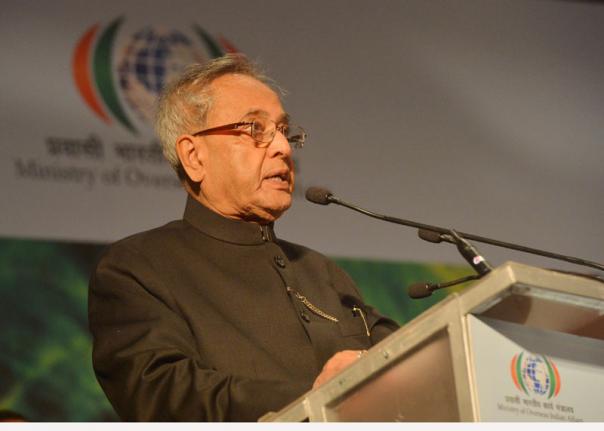
Kochi, Jan 10: President Pranab Mukherjee Wednesday said India sees its vast diaspora as a valuable contributor to its growth and is keen to expand the bonds further in building an inclusive and knowledge society.
The president said the record remittance of $67 billion from overseas Indians was a testimony to both the emotional attachment and the fulfillment in investing in India's strong economy.
"We should explore ways and means to encourage further participation by the diaspora to give additional impetus to India's growth story," Mukherjee said at the 11th Pravasi Bharatiya Divas here.
"I also wish to see the Indian diaspora as a stronger partner, not only in India's economic growth, but also in building India's knowledge society, while continuing to engage culturally and emotionally, and serving as the effective ambassadors that they have been for this country," the president said.
He said India was the world's third-largest economy on the basis of purchasing power parity and the second fastest growing economy after China.
"In six out of nine years, our country managed to grow at a rate above eight percent. Due to the slowdown in the global economy and other factors, the growth rates have declined -- from 8.4 percent in 2010-11 to 6.5 percent in 2011-12, and further to 5.4 percent in the first half of 2012-13," he said.
He said the diaspora could become partners in India's progress.
"For accelerated growth, investment level has to increase. You all can help in the process by investing in Indian companies and establishing new ventures. The yield of Indian equity markets is amongst the highest in the world and many of the most famous companies have established business here or seeking to do so," he said.
Mukherjee said that during his tenure as finance minister, he opened up the Indian capital market for qualified foreign investors (QFIs).
"Initially, we permitted QFIs to invest in Indian mutual funds and on January 1, 2012, in a far-reaching decision, we opened the doors for them to directly invest in Indian equities.
"Soon, the corporate bond market was opened to QFIs. You may, therefore, also like to look at the opportunity that India offers in this regard and take advantage of the high yield that you are likely to get by investing in the Indian capital markets," he said.
Pravasi Bharatiya Divas -- India's annual exposition to connect with its 130-million diaspora in 130 countries -- also saw the president confer the Pravasi Bharatiya Samman awards on 15 pre-eminent overseas Indians for their contributions.
In his address, the president lauded the contributions of the Indian diaspora in areas ranging from social service and polity to economy, science and culture.
"It is a matter of pride for every Indian that there are at least five heads of state or government, and over 70 senior political leaders such as deputy heads of state, speakers, ministers in various countries, who can trace their roots to India," Mukherjee said.
The chief guest at the event was Mauritius President Rajkeswur Purryag, who was also among the recipients of the Pravasi Bharatiya Samman.





Comments
Add new comment